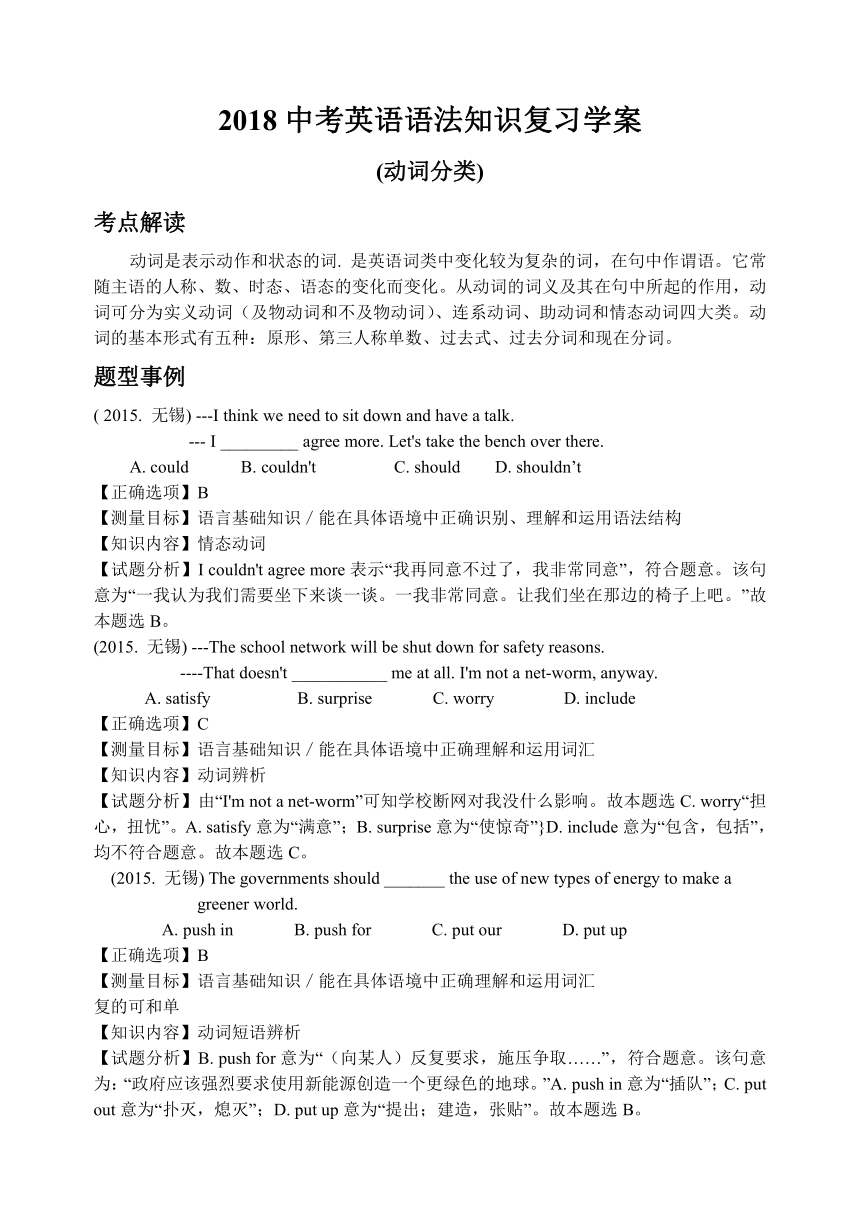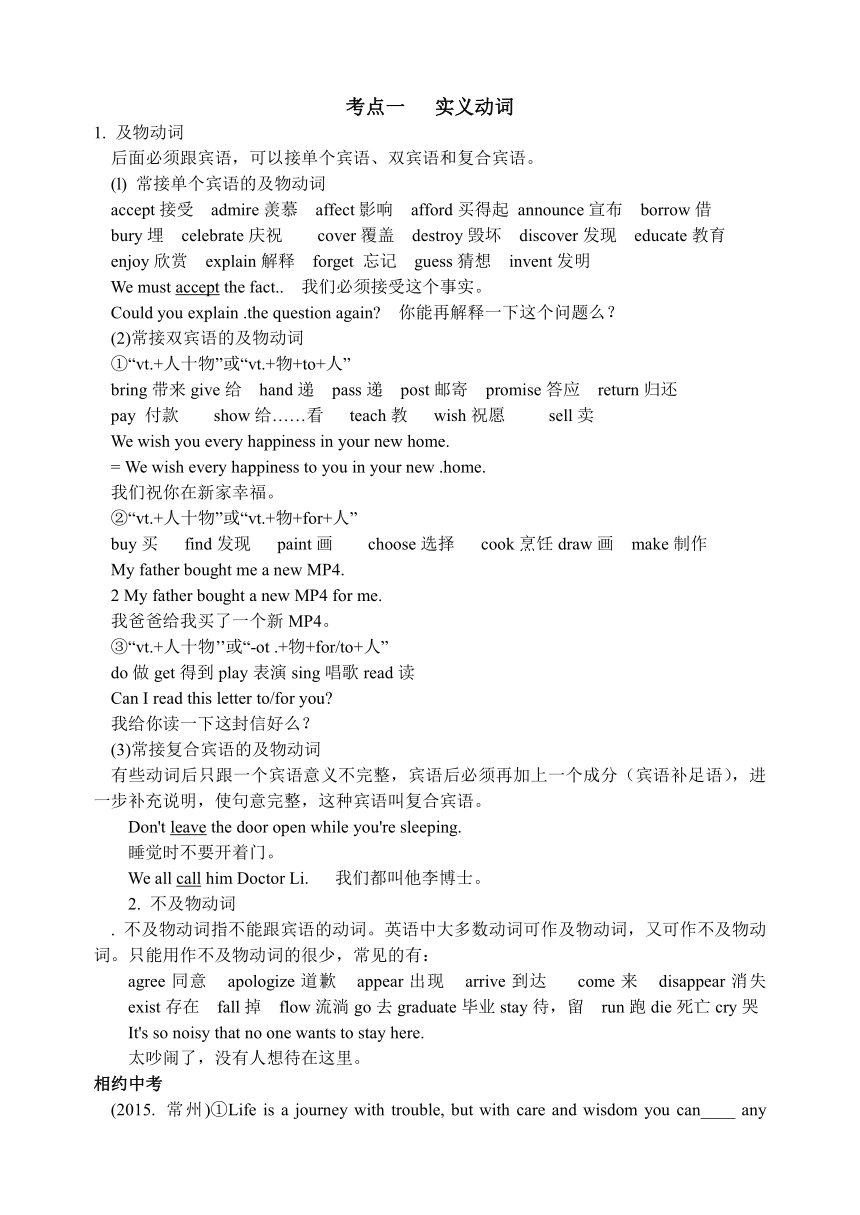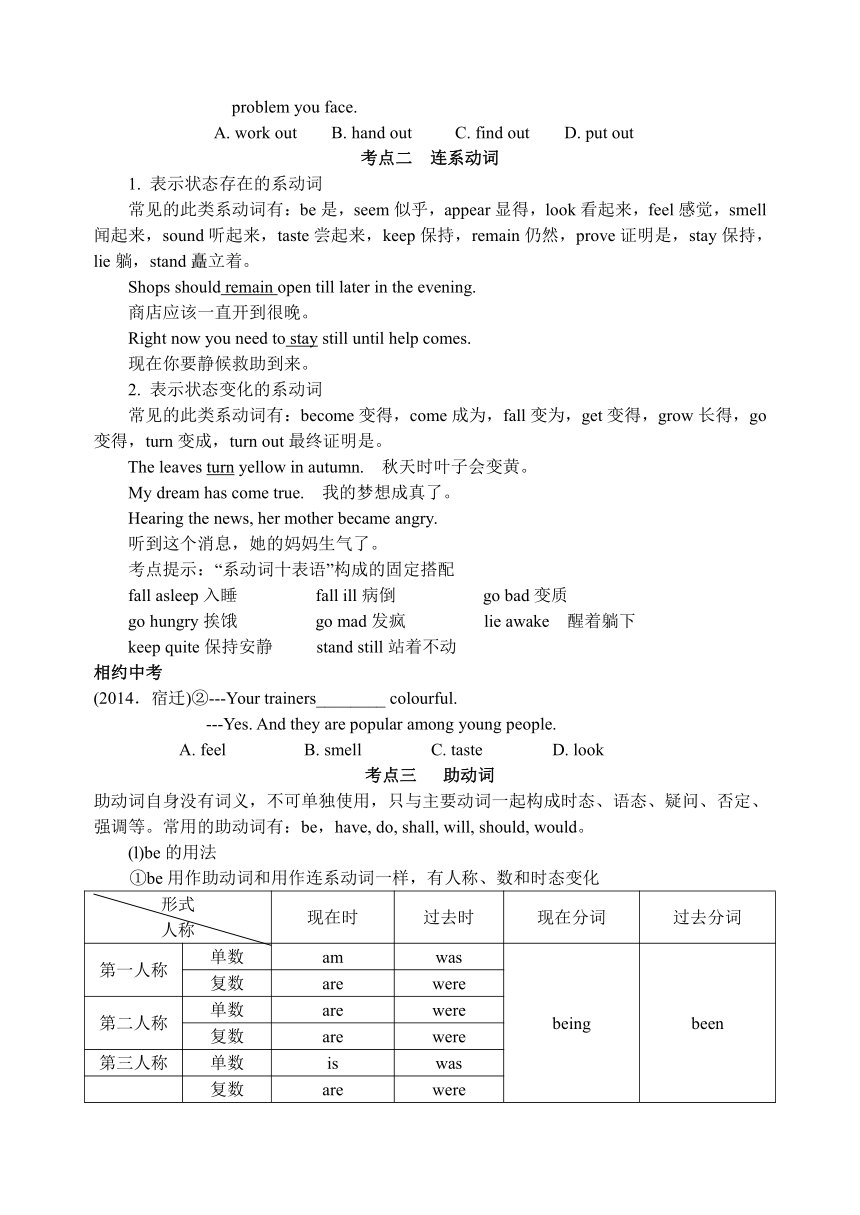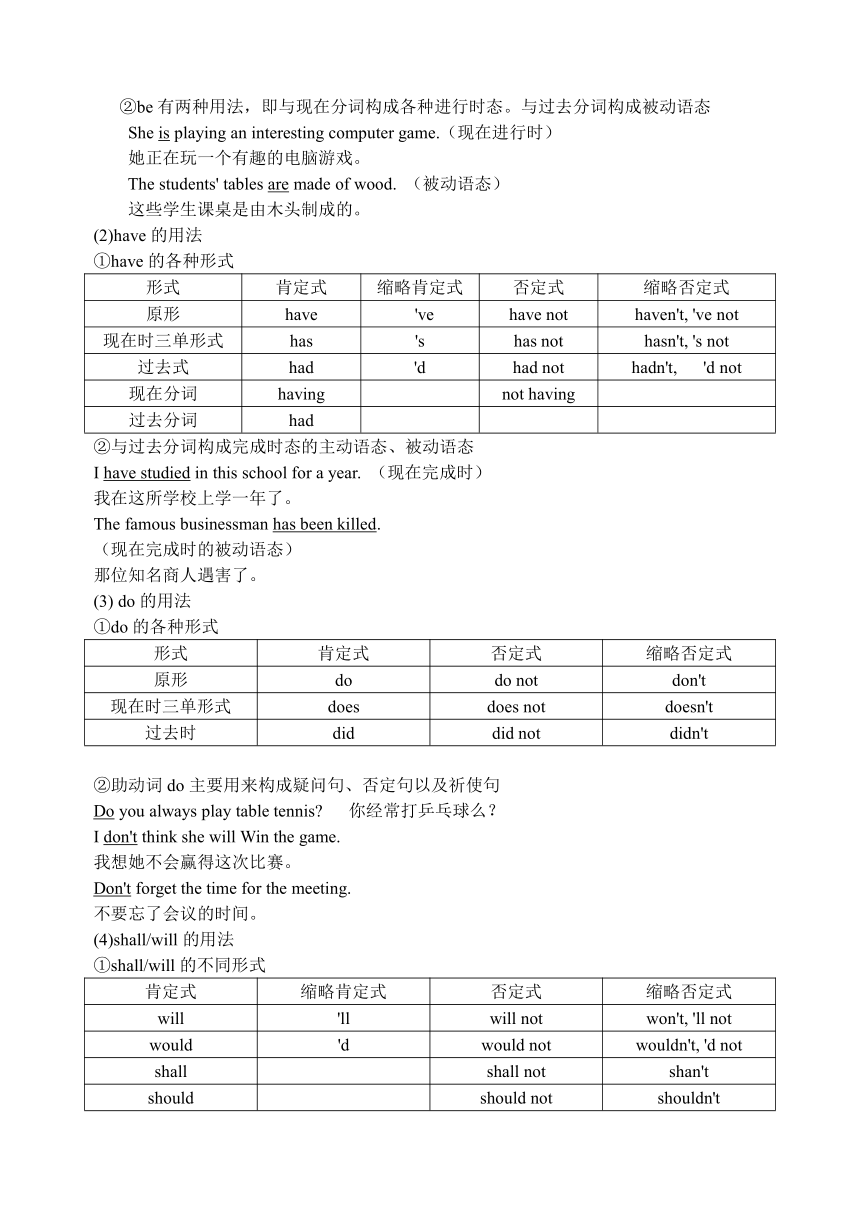中考英语语法知识复习学案(动词分类)
文档属性
| 名称 | 中考英语语法知识复习学案(动词分类) |

|
|
| 格式 | zip | ||
| 文件大小 | 112.5KB | ||
| 资源类型 | 教案 | ||
| 版本资源 | 牛津译林版 | ||
| 科目 | 英语 | ||
| 更新时间 | 2018-10-29 19:38:10 | ||
图片预览




文档简介
2018中考英语语法知识复习学案
(动词分类)
考点解读
动词是表示动作和状态的词. 是英语词类中变化较为复杂的词,在句中作谓语。它常随主语的人称、数、时态、语态的变化而变化。从动词的词义及其在句中所起的作用,动词可分为实义动词(及物动词和不及物动词)、连系动词、助动词和情态动词四大类。动词的基本形式有五种:原形、第三人称单数、过去式、过去分词和现在分词。
题型事例
( 2015. 无锡) ---I think we need to sit down and have a talk.
--- I _________ agree more. Let's take the bench over there.
A. could B. couldn't C. should D. shouldn’t
【正确选项】B
【测量目标】语言基础知识/能在具体语境中正确识别、理解和运用语法结构
【知识内容】情态动词
【试题分析】I couldn't agree more表示“我再同意不过了,我非常同意”,符合题意。该句意为“一我认为我们需要坐下来谈一谈。一我非常同意。让我们坐在那边的椅子上吧。”故本题选B。
(2015. 无锡) ---The school network will be shut down for safety reasons.
----That doesn't ___________ me at all. I'm not a net-worm, anyway.
A. satisfy B. surprise C. worry D. include
【正确选项】C
【测量目标】语言基础知识/能在具体语境中正确理解和运用词汇
【知识内容】动词辨析
【试题分析】由“I'm not a net-worm”可知学校断网对我没什么影响。故本题选C. worry“担心,扭忧”。A. satisfy意为“满意”;B. surprise意为“使惊奇”}D. include意为“包含,包括”,均不符合题意。故本题选C。
(2015. 无锡) The governments should ??_______ the use of new types of energy to make a
greener world.
A. push in B. push for C. put our D. put up
【正确选项】B
【测量目标】语言基础知识/能在具体语境中正确理解和运用词汇
复的可和单
【知识内容】动词短语辨析
【试题分析】B. push for意为“(向某人)反复要求,施压争取……”,符合题意。该句意为:“政府应该强烈要求使用新能源创造一个更绿色的地球。”A. push in意为“插队”;C. put out意为“扑灭,熄灭”;D. put up意为“提出;建造,张贴”。故本题选B。
考点一 实义动词
1. 及物动词
后面必须跟宾语,可以接单个宾语、双宾语和复合宾语。
(l) 常接单个宾语的及物动词
accept接受 admire羡慕 affect影响 afford买得起 announce宣布 borrow借
bury埋 celebrate庆祝 cover覆盖 destroy毁坏 discover发现 educate教育
enjoy欣赏 explain解释 forget 忘记 guess猜想 invent发明
We must accept the fact.. 我们必须接受这个事实。
Could you explain .the question again? 你能再解释一下这个问题么?
(2)常接双宾语的及物动词
①“vt.+人十物”或“vt.+物+to+人”
bring带来give给 hand递 pass递 post邮寄 promise答应 return归还
pay 付款 show给……看 teach教 wish祝愿 sell卖
We wish you every happiness in your new home.
= We wish every happiness to you in your new .home.
我们祝你在新家幸福。
②“vt.+人十物”或“vt.+物+for+人”
buy买 find发现 paint画 choose选择 cook烹饪draw画 make制作
My father bought me a new MP4.
2 My father bought a new MP4 for me.
我爸爸给我买了一个新MP4。
③“vt.+人十物’’或“-ot .+物+for/to+人”
do做get得到play表演sing唱歌read读
Can I read this letter to/for you?
我给你读一下这封信好么?
(3)常接复合宾语的及物动词
有些动词后只跟一个宾语意义不完整,宾语后必须再加上一个成分(宾语补足语),进一步补充说明,使句意完整,这种宾语叫复合宾语。
Don't leave the door open while you're sleeping.
睡觉时不要开着门。
We all call him Doctor Li. 我们都叫他李博士。
2. 不及物动词
. 不及物动词指不能跟宾语的动词。英语中大多数动词可作及物动词,又可作不及物动词。只能用作不及物动词的很少,常见的有:
agree同意 apologize道歉 appear出现 arrive到达 come来 disappear消失 exist存在 fall掉 flow流淌go去graduate毕业stay待,留 run跑die死亡cry哭
It's so noisy that no one wants to stay here.
太吵闹了,没有人想待在这里。
相约中考
(2015. 常州)①Life is a journey with trouble, but with care and wisdom you can____ any problem you face.
A. work out B. hand out C. find out D. put out
考点二 连系动词
1. 表示状态存在的系动词
常见的此类系动词有:be是,seem似乎,appear显得,look看起来,feel感觉,smell闻起来,sound听起来,taste尝起来,keep保持,remain仍然,prove证明是,stay保持,lie躺,stand矗立着。
Shops should remain open till later in the evening.
商店应该一直开到很晚。
Right now you need to stay still until help comes.
现在你要静候救助到来。
2. 表示状态变化的系动词
常见的此类系动词有:become变得,come成为,fall变为,get变得,grow长得,go变得,turn变成,turn out最终证明是。
The leaves turn yellow in autumn. 秋天时叶子会变黄。
My dream has come true. 我的梦想成真了。
Hearing the news, her mother became angry.
听到这个消息,她的妈妈生气了。
考点提示:“系动词十表语”构成的固定搭配
fall asleep入睡 fall ill病倒 go bad变质
go hungry挨饿 go mad发疯 lie awake 醒着躺下
keep quite保持安静 stand still站着不动
相约中考
(2014.宿迁)②---Your trainers________ colourful.
---Yes. And they are popular among young people.
A. feel B. smell C. taste D. look
考点三 助动词
助动词自身没有词义,不可单独使用,只与主要动词一起构成时态、语态、疑问、否定、强调等。常用的助动词有:be,have, do, shall, will, should, would。
(l)be的用法
①be用作助动词和用作连系动词一样,有人称、数和时态变化
形式 人称 现在时 过去时 现在分词 过去分词
第一人称 单数 am was being been
复数 are were
第二人称 单数 are were
复数 are were
第三人称 单数 is was
复数 are were
②be有两种用法,即与现在分词构成各种进行时态。与过去分词构成被动语态
She is playing an interesting computer game.(现在进行时)
她正在玩一个有趣的电脑游戏。
The students' tables are made of wood. (被动语态)
这些学生课桌是由木头制成的。
(2)have的用法
①have的各种形式
形式 肯定式 缩略肯定式 否定式 缩略否定式
原形 have 've have not haven't, 've not
现在时三单形式 has 's has not hasn't, 's not
过去式 had 'd had not hadn't, 'd not
现在分词 having not having
过去分词 had
②与过去分词构成完成时态的主动语态、被动语态
I have studied in this school for a year. (现在完成时)
我在这所学校上学一年了。
The famous businessman has been killed.
(现在完成时的被动语态)
那位知名商人遇害了。
(3) do的用法
①do的各种形式
形式 肯定式 否定式 缩略否定式
原形 do do not don't
现在时三单形式 does does not doesn't
过去时 did did not didn't
②助动词do主要用来构成疑问句、否定句以及祈使句
Do you always play table tennis? 你经常打乒乓球么?
I don't think she will Win the game.
我想她不会赢得这次比赛。
Don't forget the time for the meeting.
不要忘了会议的时间。
(4)shall/will的用法
①shall/will的不同形式
肯定式 缩略肯定式 否定式 缩略否定式
will 'll will not won't, 'll not
would 'd would not wouldn't, 'd not
shall shall not shan't
should should not shouldn't
②shall, should, will, would之后均接动词原形,用来构成各种将来时。
I will think over your question.
我会好好考虑你的问题.
My parents phoned that they would arrive the next day.
我父母打来电话说他们第二天到。
I shall go to study in Japan next year. 明年我要到日本去学习。
相约中考
(2014. 扬州)③---When will A Bite of China II begin tonight?
---It __________ for ten minutes.
A. will begin B. has begun C. will be on D. has be on
考点四 情态动词
1. 常见的情态动词
现在时 +not的简略形式 过去式 +not的简略形式
can can t could couldn't
may may not might mightn't
must mustn't
should shouldn't
ought to oughtn't to ought to oughtn't to
need needn't
dare daren't dared daren't
will won't would wouldn't
shall shan't should shouldn't
2. 情悉动词must,may,might,could,can表示推测:
以must为例:must+ do( be)是推测现在存在的一般状态;must+ be doing是推测可能正在进行的事情;must+ havedone是推测可能已经发生过的事情。
(l) must。肯定,一定”语气强,只用于肯定句中。
He must be a man from America. 他肯定是美国人。
He must be talking with his friend. 他肯定在和朋友交谈。
He must have already arrived there. 他一定已经到达那里了。
(2)may和might都表示“也许”,但后者语气弱,更没有把握。可用于肯定句和否定句。
He may not be at home
他也许不在家。
They might have finished their task. 他们也许已经完成了任务。
(3)can和could都表示“可能”,could表示可疑的可能性,不及can语气强,用于肯定、否定、疑问句中。
The weather in that city could be cold now.
现在那个城市的天气可能比较冷了。
We could have walked there, it was so near.
我们本来可以走到这儿,因为是如此之近。
(推测某事本来可能发生,但实际上没有发生)
---Can he be in the office now? (他现在可能在办公室吗?)
---No, he can't be there,
不,不可能在那儿,因为我刚才看见他在图书馆。
(语气很强,常用于疑问句和否定句中)
注意:
(l)c-an和be able to:都可以表示能力。但be able to可以表达“某事终于成功”,而can无法表达此意。be able to有更多的时态。另外,两者不能重叠使用。
(2) used to和would:used to表示过去常常做现在已经不再有的习惯. 而would只表示过去的习惯或喜好,不涉及现在。
(3)need和dare作情态动词和实义动词的区别:两者作情态动词时常用于否定句和疑问句。其形式为:needn't/daren't do; need/dare… Do …?作实义动词时可用于肯定句,否定句和疑问句。其形式为:need(needs/needed)/ dare ( dares/dared) to do,don't (doesn't, didn't) need/dare to do。
相约中考
(2015 .盐城) ④--Do you have any plans for this summer vacation?
---I’ m not sure. I __________ take a trip to Taiwan.
A. must B. need C. may D. should
常见易混动词和动词短语辨析
look为不及物动词,意为“看着”,强调看的动作,表示有意识地集中精神去看,但并不一定能看见,多用来唤起别人的注意,其后接宾语时,要加上介词at; see多数情况下用作及物动词,意为“看见”,强调看见的结果,但不一定是有意识地看,”看电影、看医生’’也常用这个词;watch为及物动词,意为“观看”,指非常仔细地,有目地,集中注意力地看,“看电视、看比赛”习惯上用这个词。
(2) speak/talk/say/tell
speak意为“讲话”,通常指说话的能力和方式;talk意为“谈论;谈话”,强调与他人交谈;say意为“说”,强调说话的内容;tell意为“告诉”,强调讲给别人听。
( 3)listen/hear/sound
listen意为“听”,经常与t0连用,指努力地去听,强调听的动作;hear意为“听见”,强调听的结果;sound意为“听,听起来”,强调听到后的感受。
(4) take/bring/carry/get/fetch
take“带走”,常与there连用,常用短语有take away“拿走”;bring“拿来”,常与here连用;get“得到”,常用短语有getback“拿回来”;carry “搬运”,不强调方向,带有负重的意思;fetch“去拿”,强调来回。
(5)think of/think about/think over
think about和think of都表示“考虑;对……有某种看法”时,可以互换o think of表示“打算;想出;关心等时,一般不与think about互换;think about表示“经过思考、研究一时,
一般也不和think of互换,think over意为“仔细考虑”。
易错防范
典例呈现一
( ) They ________ play football last Friday because Simon forgot to bring his football here.
A. could B. couldn't C. can't D. can
【答案】B
【易错剖析】由于考生不了解句意,易误选A.D项,认为他们上周五可能踢了足球;由于不知道can通常用于一般现在时态,或是没有注意句子所用的时态last Friday,易误选C项。其实couldn't是could的否定式,表示推测时,他们并不是过去式,只是在语气上比can或can't委婉;could和couldn't表示推测时,可用于肯定句、否定句和疑问句。could和couldn't一般用于过去的时态。
典例呈现二
( ) ---I??????????????????????____________ cleaning my bedroom. It's clean now.
---Wow. When____________ you _________it?
A. have finished; did; finish B. finished; have; finished
C. finish;do;finish D. have finished; have; finished
【答案】A
【易错剖析】由于看到上一句中的now一词,考生误以为应填一般现在时,易误选C项;由于打扫卧室这个动作发生在过去,考生误以为应填一般过去耐,易误选B项;根据上一句中的“It's clean now”可知,打扫完卧室对现在产生了影响,应用现在完成时,强调过去的动作对现在造成的影响,以为答句也用现在完成时,易误选D项。结合语境可知,答句是问:你何时打扫完的?应用一般过去时,描述过去发生的动作。
巩固训练
一.词汇运用
l. Our team seems to have ______________ (fall) behind the others.
2. Xiao Li promised to chat with me on the Internet, but so far he __________ (not do) so.
3. Sound ______________ (travel) through air at a speed of about 340 metres per second.
4. The old computer ___________ (break) down easily, so I had to restart it again and again.
5. The little girl will give the flowers to the hero when he _____________(appear).
6. That story ______________(听起来) interesting, but it _______(是) not true.
7. I try to ______________ (使) my room clean.
8. The little boy _________________(会说) three foreign languages.
9. ______________ (让) him have the bread first.
10. She ______________ (给......看) a good magazine to me yesterday.
二.单项填空
( )1. How long may I__________ the library book, please?
A. lend B. keep C. borrow D. return
( )2. My father is sleeping now, could you__________ the radio a bit?
A. turn up B. turn on C. turn down D. turn off
( )3. ---Tom. please tell Jack the good news.
----I _____________ . His father has told him about it already.
A. don't have to B. have to C. must D. mustn't
( )4. ---I'm sorry I ____________ my homework at home.
---That's all right. Don't forget __________ it to school this afternoon.
A. forget; take B. forget; to bring C. left; to take D. left; to bring
( ) 5. Cotton_____________ nice and soft.
A. is felt B. is feeling C. feel D. feels
( ) 6. Look! How heavy the rain is! You'd better_____________ .
A. stay here when it stops B. don't go now .
C. not leave until it stops D. not to leave at once
( )7. I really enjoy the noodles and vegetables. They _____________ delicious.
A. stay B. feel C. taste D. sound
( )8. To protect the environment, supermarkets don't ________ free plastic bags to shoppers.
A. take B. show C. provide D. carry
( )9. ---I phoned you at 5:00 p. m. yesterday, but you didn't answer me.
---Sorry. I_______ the flowers in the garden at that moment.
A. watered B. was watering C. am watering D. have watered
( ) 10. We _________ be more careful, or we will make the same mistake in the experiment.
A. might B. can C. may D. should
答案:
语法点拨 ADDC
巩固训练
一、1. fallen 2. hasn’t done 3. travels 4. broke 5. appears 6. sounds, is
7. make / leave 8. can speak 9. Let 10. showed
二、 BCADD CCCBD
(动词分类)
考点解读
动词是表示动作和状态的词. 是英语词类中变化较为复杂的词,在句中作谓语。它常随主语的人称、数、时态、语态的变化而变化。从动词的词义及其在句中所起的作用,动词可分为实义动词(及物动词和不及物动词)、连系动词、助动词和情态动词四大类。动词的基本形式有五种:原形、第三人称单数、过去式、过去分词和现在分词。
题型事例
( 2015. 无锡) ---I think we need to sit down and have a talk.
--- I _________ agree more. Let's take the bench over there.
A. could B. couldn't C. should D. shouldn’t
【正确选项】B
【测量目标】语言基础知识/能在具体语境中正确识别、理解和运用语法结构
【知识内容】情态动词
【试题分析】I couldn't agree more表示“我再同意不过了,我非常同意”,符合题意。该句意为“一我认为我们需要坐下来谈一谈。一我非常同意。让我们坐在那边的椅子上吧。”故本题选B。
(2015. 无锡) ---The school network will be shut down for safety reasons.
----That doesn't ___________ me at all. I'm not a net-worm, anyway.
A. satisfy B. surprise C. worry D. include
【正确选项】C
【测量目标】语言基础知识/能在具体语境中正确理解和运用词汇
【知识内容】动词辨析
【试题分析】由“I'm not a net-worm”可知学校断网对我没什么影响。故本题选C. worry“担心,扭忧”。A. satisfy意为“满意”;B. surprise意为“使惊奇”}D. include意为“包含,包括”,均不符合题意。故本题选C。
(2015. 无锡) The governments should ??_______ the use of new types of energy to make a
greener world.
A. push in B. push for C. put our D. put up
【正确选项】B
【测量目标】语言基础知识/能在具体语境中正确理解和运用词汇
复的可和单
【知识内容】动词短语辨析
【试题分析】B. push for意为“(向某人)反复要求,施压争取……”,符合题意。该句意为:“政府应该强烈要求使用新能源创造一个更绿色的地球。”A. push in意为“插队”;C. put out意为“扑灭,熄灭”;D. put up意为“提出;建造,张贴”。故本题选B。
考点一 实义动词
1. 及物动词
后面必须跟宾语,可以接单个宾语、双宾语和复合宾语。
(l) 常接单个宾语的及物动词
accept接受 admire羡慕 affect影响 afford买得起 announce宣布 borrow借
bury埋 celebrate庆祝 cover覆盖 destroy毁坏 discover发现 educate教育
enjoy欣赏 explain解释 forget 忘记 guess猜想 invent发明
We must accept the fact.. 我们必须接受这个事实。
Could you explain .the question again? 你能再解释一下这个问题么?
(2)常接双宾语的及物动词
①“vt.+人十物”或“vt.+物+to+人”
bring带来give给 hand递 pass递 post邮寄 promise答应 return归还
pay 付款 show给……看 teach教 wish祝愿 sell卖
We wish you every happiness in your new home.
= We wish every happiness to you in your new .home.
我们祝你在新家幸福。
②“vt.+人十物”或“vt.+物+for+人”
buy买 find发现 paint画 choose选择 cook烹饪draw画 make制作
My father bought me a new MP4.
2 My father bought a new MP4 for me.
我爸爸给我买了一个新MP4。
③“vt.+人十物’’或“-ot .+物+for/to+人”
do做get得到play表演sing唱歌read读
Can I read this letter to/for you?
我给你读一下这封信好么?
(3)常接复合宾语的及物动词
有些动词后只跟一个宾语意义不完整,宾语后必须再加上一个成分(宾语补足语),进一步补充说明,使句意完整,这种宾语叫复合宾语。
Don't leave the door open while you're sleeping.
睡觉时不要开着门。
We all call him Doctor Li. 我们都叫他李博士。
2. 不及物动词
. 不及物动词指不能跟宾语的动词。英语中大多数动词可作及物动词,又可作不及物动词。只能用作不及物动词的很少,常见的有:
agree同意 apologize道歉 appear出现 arrive到达 come来 disappear消失 exist存在 fall掉 flow流淌go去graduate毕业stay待,留 run跑die死亡cry哭
It's so noisy that no one wants to stay here.
太吵闹了,没有人想待在这里。
相约中考
(2015. 常州)①Life is a journey with trouble, but with care and wisdom you can____ any problem you face.
A. work out B. hand out C. find out D. put out
考点二 连系动词
1. 表示状态存在的系动词
常见的此类系动词有:be是,seem似乎,appear显得,look看起来,feel感觉,smell闻起来,sound听起来,taste尝起来,keep保持,remain仍然,prove证明是,stay保持,lie躺,stand矗立着。
Shops should remain open till later in the evening.
商店应该一直开到很晚。
Right now you need to stay still until help comes.
现在你要静候救助到来。
2. 表示状态变化的系动词
常见的此类系动词有:become变得,come成为,fall变为,get变得,grow长得,go变得,turn变成,turn out最终证明是。
The leaves turn yellow in autumn. 秋天时叶子会变黄。
My dream has come true. 我的梦想成真了。
Hearing the news, her mother became angry.
听到这个消息,她的妈妈生气了。
考点提示:“系动词十表语”构成的固定搭配
fall asleep入睡 fall ill病倒 go bad变质
go hungry挨饿 go mad发疯 lie awake 醒着躺下
keep quite保持安静 stand still站着不动
相约中考
(2014.宿迁)②---Your trainers________ colourful.
---Yes. And they are popular among young people.
A. feel B. smell C. taste D. look
考点三 助动词
助动词自身没有词义,不可单独使用,只与主要动词一起构成时态、语态、疑问、否定、强调等。常用的助动词有:be,have, do, shall, will, should, would。
(l)be的用法
①be用作助动词和用作连系动词一样,有人称、数和时态变化
形式 人称 现在时 过去时 现在分词 过去分词
第一人称 单数 am was being been
复数 are were
第二人称 单数 are were
复数 are were
第三人称 单数 is was
复数 are were
②be有两种用法,即与现在分词构成各种进行时态。与过去分词构成被动语态
She is playing an interesting computer game.(现在进行时)
她正在玩一个有趣的电脑游戏。
The students' tables are made of wood. (被动语态)
这些学生课桌是由木头制成的。
(2)have的用法
①have的各种形式
形式 肯定式 缩略肯定式 否定式 缩略否定式
原形 have 've have not haven't, 've not
现在时三单形式 has 's has not hasn't, 's not
过去式 had 'd had not hadn't, 'd not
现在分词 having not having
过去分词 had
②与过去分词构成完成时态的主动语态、被动语态
I have studied in this school for a year. (现在完成时)
我在这所学校上学一年了。
The famous businessman has been killed.
(现在完成时的被动语态)
那位知名商人遇害了。
(3) do的用法
①do的各种形式
形式 肯定式 否定式 缩略否定式
原形 do do not don't
现在时三单形式 does does not doesn't
过去时 did did not didn't
②助动词do主要用来构成疑问句、否定句以及祈使句
Do you always play table tennis? 你经常打乒乓球么?
I don't think she will Win the game.
我想她不会赢得这次比赛。
Don't forget the time for the meeting.
不要忘了会议的时间。
(4)shall/will的用法
①shall/will的不同形式
肯定式 缩略肯定式 否定式 缩略否定式
will 'll will not won't, 'll not
would 'd would not wouldn't, 'd not
shall shall not shan't
should should not shouldn't
②shall, should, will, would之后均接动词原形,用来构成各种将来时。
I will think over your question.
我会好好考虑你的问题.
My parents phoned that they would arrive the next day.
我父母打来电话说他们第二天到。
I shall go to study in Japan next year. 明年我要到日本去学习。
相约中考
(2014. 扬州)③---When will A Bite of China II begin tonight?
---It __________ for ten minutes.
A. will begin B. has begun C. will be on D. has be on
考点四 情态动词
1. 常见的情态动词
现在时 +not的简略形式 过去式 +not的简略形式
can can t could couldn't
may may not might mightn't
must mustn't
should shouldn't
ought to oughtn't to ought to oughtn't to
need needn't
dare daren't dared daren't
will won't would wouldn't
shall shan't should shouldn't
2. 情悉动词must,may,might,could,can表示推测:
以must为例:must+ do( be)是推测现在存在的一般状态;must+ be doing是推测可能正在进行的事情;must+ havedone是推测可能已经发生过的事情。
(l) must。肯定,一定”语气强,只用于肯定句中。
He must be a man from America. 他肯定是美国人。
He must be talking with his friend. 他肯定在和朋友交谈。
He must have already arrived there. 他一定已经到达那里了。
(2)may和might都表示“也许”,但后者语气弱,更没有把握。可用于肯定句和否定句。
He may not be at home
他也许不在家。
They might have finished their task. 他们也许已经完成了任务。
(3)can和could都表示“可能”,could表示可疑的可能性,不及can语气强,用于肯定、否定、疑问句中。
The weather in that city could be cold now.
现在那个城市的天气可能比较冷了。
We could have walked there, it was so near.
我们本来可以走到这儿,因为是如此之近。
(推测某事本来可能发生,但实际上没有发生)
---Can he be in the office now? (他现在可能在办公室吗?)
---No, he can't be there,
不,不可能在那儿,因为我刚才看见他在图书馆。
(语气很强,常用于疑问句和否定句中)
注意:
(l)c-an和be able to:都可以表示能力。但be able to可以表达“某事终于成功”,而can无法表达此意。be able to有更多的时态。另外,两者不能重叠使用。
(2) used to和would:used to表示过去常常做现在已经不再有的习惯. 而would只表示过去的习惯或喜好,不涉及现在。
(3)need和dare作情态动词和实义动词的区别:两者作情态动词时常用于否定句和疑问句。其形式为:needn't/daren't do; need/dare… Do …?作实义动词时可用于肯定句,否定句和疑问句。其形式为:need(needs/needed)/ dare ( dares/dared) to do,don't (doesn't, didn't) need/dare to do。
相约中考
(2015 .盐城) ④--Do you have any plans for this summer vacation?
---I’ m not sure. I __________ take a trip to Taiwan.
A. must B. need C. may D. should
常见易混动词和动词短语辨析
look为不及物动词,意为“看着”,强调看的动作,表示有意识地集中精神去看,但并不一定能看见,多用来唤起别人的注意,其后接宾语时,要加上介词at; see多数情况下用作及物动词,意为“看见”,强调看见的结果,但不一定是有意识地看,”看电影、看医生’’也常用这个词;watch为及物动词,意为“观看”,指非常仔细地,有目地,集中注意力地看,“看电视、看比赛”习惯上用这个词。
(2) speak/talk/say/tell
speak意为“讲话”,通常指说话的能力和方式;talk意为“谈论;谈话”,强调与他人交谈;say意为“说”,强调说话的内容;tell意为“告诉”,强调讲给别人听。
( 3)listen/hear/sound
listen意为“听”,经常与t0连用,指努力地去听,强调听的动作;hear意为“听见”,强调听的结果;sound意为“听,听起来”,强调听到后的感受。
(4) take/bring/carry/get/fetch
take“带走”,常与there连用,常用短语有take away“拿走”;bring“拿来”,常与here连用;get“得到”,常用短语有getback“拿回来”;carry “搬运”,不强调方向,带有负重的意思;fetch“去拿”,强调来回。
(5)think of/think about/think over
think about和think of都表示“考虑;对……有某种看法”时,可以互换o think of表示“打算;想出;关心等时,一般不与think about互换;think about表示“经过思考、研究一时,
一般也不和think of互换,think over意为“仔细考虑”。
易错防范
典例呈现一
( ) They ________ play football last Friday because Simon forgot to bring his football here.
A. could B. couldn't C. can't D. can
【答案】B
【易错剖析】由于考生不了解句意,易误选A.D项,认为他们上周五可能踢了足球;由于不知道can通常用于一般现在时态,或是没有注意句子所用的时态last Friday,易误选C项。其实couldn't是could的否定式,表示推测时,他们并不是过去式,只是在语气上比can或can't委婉;could和couldn't表示推测时,可用于肯定句、否定句和疑问句。could和couldn't一般用于过去的时态。
典例呈现二
( ) ---I??????????????????????____________ cleaning my bedroom. It's clean now.
---Wow. When____________ you _________it?
A. have finished; did; finish B. finished; have; finished
C. finish;do;finish D. have finished; have; finished
【答案】A
【易错剖析】由于看到上一句中的now一词,考生误以为应填一般现在时,易误选C项;由于打扫卧室这个动作发生在过去,考生误以为应填一般过去耐,易误选B项;根据上一句中的“It's clean now”可知,打扫完卧室对现在产生了影响,应用现在完成时,强调过去的动作对现在造成的影响,以为答句也用现在完成时,易误选D项。结合语境可知,答句是问:你何时打扫完的?应用一般过去时,描述过去发生的动作。
巩固训练
一.词汇运用
l. Our team seems to have ______________ (fall) behind the others.
2. Xiao Li promised to chat with me on the Internet, but so far he __________ (not do) so.
3. Sound ______________ (travel) through air at a speed of about 340 metres per second.
4. The old computer ___________ (break) down easily, so I had to restart it again and again.
5. The little girl will give the flowers to the hero when he _____________(appear).
6. That story ______________(听起来) interesting, but it _______(是) not true.
7. I try to ______________ (使) my room clean.
8. The little boy _________________(会说) three foreign languages.
9. ______________ (让) him have the bread first.
10. She ______________ (给......看) a good magazine to me yesterday.
二.单项填空
( )1. How long may I__________ the library book, please?
A. lend B. keep C. borrow D. return
( )2. My father is sleeping now, could you__________ the radio a bit?
A. turn up B. turn on C. turn down D. turn off
( )3. ---Tom. please tell Jack the good news.
----I _____________ . His father has told him about it already.
A. don't have to B. have to C. must D. mustn't
( )4. ---I'm sorry I ____________ my homework at home.
---That's all right. Don't forget __________ it to school this afternoon.
A. forget; take B. forget; to bring C. left; to take D. left; to bring
( ) 5. Cotton_____________ nice and soft.
A. is felt B. is feeling C. feel D. feels
( ) 6. Look! How heavy the rain is! You'd better_____________ .
A. stay here when it stops B. don't go now .
C. not leave until it stops D. not to leave at once
( )7. I really enjoy the noodles and vegetables. They _____________ delicious.
A. stay B. feel C. taste D. sound
( )8. To protect the environment, supermarkets don't ________ free plastic bags to shoppers.
A. take B. show C. provide D. carry
( )9. ---I phoned you at 5:00 p. m. yesterday, but you didn't answer me.
---Sorry. I_______ the flowers in the garden at that moment.
A. watered B. was watering C. am watering D. have watered
( ) 10. We _________ be more careful, or we will make the same mistake in the experiment.
A. might B. can C. may D. should
答案:
语法点拨 ADDC
巩固训练
一、1. fallen 2. hasn’t done 3. travels 4. broke 5. appears 6. sounds, is
7. make / leave 8. can speak 9. Let 10. showed
二、 BCADD CCCBD
同课章节目录
- 词法
- 名词
- 动词和动词短语
- 动词语态
- 动词时态
- 助动词和情态动词
- 非谓语动词
- 冠词
- 代词
- 数词和量词
- 形容词副词及其比较等级
- 介词和介词短语
- 连词和感叹词
- 构词法
- 相似、相近词比较
- 句法
- 陈述句
- 一般疑问句和否定疑问句
- 特殊疑问句及选择疑问句
- 反意疑问句
- 存在句(There be句型)
- 宾语从句
- 定语从句
- 状语从句
- 主谓一致问题
- 简单句
- 并列句
- 复合句
- 主谓一致
- 主、表语从句
- 名词性从句
- 直接引语和间接引语
- 虚拟语气
- 感叹句
- 强调句
- 倒装句
- 祈使句
- 句子的成分
- 句子的分类
- 题型专区
- 单项选择部分
- 易错题
- 完形填空
- 阅读理解
- 词汇练习
- 听说训练
- 句型转换
- 补全对话
- 短文改错
- 翻译
- 书面表达
- 任务型阅读
- 语法填空
- 其他资料
